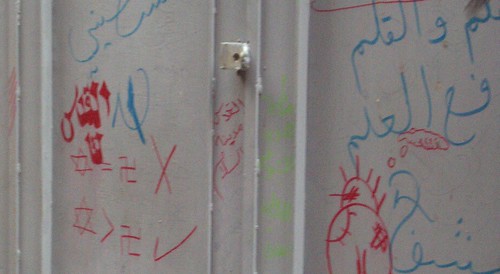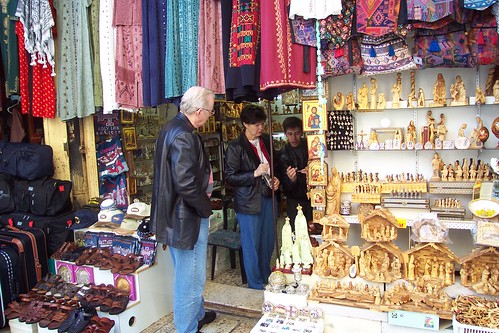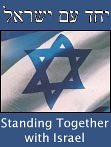Friday, May 13, 2005
Memory of my confidence-building encounter
I still remember naivete, and the day I lost a lot of it. Of course, many of you to my right will disagree, claiming I never lost it. While those to my left will say it wasn't naivete I lost. So be it, I welcome your comments.
The day was in January 2001, early in the most recent intifada. My aunt and uncle were visiting and wanted to see famous sites in the Old City, including places in Arab dominated sections. I was definitely a bit nervous, not wanting to be stupid and dead, but also not wanting to give in to the fear of terrorism. I agreed to take them, with a nervous eye watching everyone suspiciously, and incredibly self-conscious of my kippa.
Obiously, we weren't killed, in fact, almost no one paid us any attention at all. I do remember the exception: a little boy walked into a bathroom as I was washing up, and stared at me, tugging on his dad's shirt sleeve, apparently shocked to see someone like me. I assume based on Arab Propaganda he was worried I would kill him and use his blood for matzah.
Another thing that surprised me was the belligerancy of the grafitti on the walls. I had comforted myself in those years with the knowledge that Zionism was no longer Racism, at least officially, so I hadn't expected stuff like this:

After walking and sight-seeing for awhile, we stopped to purchase cheap souvenirs, otherwise known as "Proof I was There". The merchants in the area were overjoyed to serve us, as almost no tourists were venturing into the maze-like walkways leading to their shops. One particular merchant was especially inviting and polite, rushing over to a neighboring kiosk to get some bottled water for us while my aunt and uncle browsed the various knick-knacks he had on display. I had a feeling his politeness was genuine, because after a few minutes talking to my relatives, trying to distinguish his chotchkas from the identical chotchkas next-door, he spent the rest of the time chatting with me, even though I wasn't the tourist with the wallet.

It was a good conversation, perhaps one we both needed to have at that time. We quickly found that we both desired peace, but I wanted to nail down what his definition of peace was.
I proposed a hypothetical land-for-peace swap, asking if he could imagine such a thing. He nodded, "Sure, sure." I smiled, and he continued, "sure, we could have such a peace for a little while, but that could not be the end. For Muslims cannot agree to Jewish sovereignty forever here."
I tried to maintain the smile. "Well, I could handle that," I said, "if we have peace for a few hundred years, and work the rest out later." I felt sure that two such polite fellows, desiring peace, could agree to let future generations live and flourish, letting trust grow slowly, and down the road count on them to make any peace permanent.
"Oh, no, not centuries, certainly not."
Ok, centuries might be an exaggeration, I thought. Changing the relationship between Palestinians and Israelis wouldn't have to take centuries, just maybe a few generations, after all, Israel had only been a state for 50 years. "Well, ok, not centuries, of course, but decades, 50 years, something like that."
"Oh, no, certainly not that long." He was still smiling as he shook his head, but my smile was starting to slip.
I wouldn't give up. The violence had to stop, the dove of peace needed some oxygen to rest up and try again. "How about twenty years?" I probably should have known better than to think I would get anywhere haggling with a professional haggler.
"No. no."
I was growing frustrated, I wanted the seller to name his price. "Ok, so tell me, what do you think is possible? We can make a peace agreement, land for peace, then what?"
"It could last a couple years. But it is inevitable, Muslims cannot allow this Jewish rule to continue. We will have to fight until eventually Jews leave." I don't know if he was expecting Jews would just pull up stakes and get the heck out of Anatevka, or if it was a coded euphemism for slaughter. His words words were all so polite, all with a civil smile, serving me bottled water, yet promising expulsion or worse.
But at least I had my answer. It seems the definition of peace to a good many Arabs is a land free of troublesome Jews. After that, what's to fight about?
Since that time, when I read of the Arab strategy of stages, I believe they mean it. I know it's sometimes hard for lovers of peace to understand not everyone shares that outlook, but not everyone does. I still love peace, yearn for it. But it's going to take a long, long time. And a quicky deal isn't going to bring peace, just maybe a year or two of quiet, if that. What is needed is the fortitude to stand up to the challenges, year after year, decade after decade if need be.
How can you be willing to let Sharon "disengage" from Gaza then, isn't it just a quickie deal?
I can support the disengagement in so much as it will strengthen us for the decades of struggle ahead, putting resources where they are most needed, preparing for coming new struggles which also need attention. It will not bring peace. It is not part of a negotiation. It is a realignment of forces, a general's repositioning of troops on the battlefield.
My support is not carte blanche. If the government eventually concludes the risks are too great, or that factors on the ground turned out in a way that increased the danger unacceptably, I for one will not complain if the disengagement is called off -- I'm sure there are some who would. And I support those who dilligently identify the risks, demanding the government's decision be fully informed. But until then, call me naive, I will trust that in a democracy, all of the risks are identified, and the leadership makes decisions. If our nation of armchair generals can't trust even this government to run the country -- that is, raise its objections without accusations of treason and govenmental anti-semitism -- then Israel is essentially ungovernable; there isn't going to be a "better" government. At that point, the alternative is anarchy, each of us feeling entitled to rule based on the correctness of our opinion, rather than the ability to gather a majority.
And that would put a nice big smile on the polite merchant's face.
Technorati Tags: blog, palestinian, disengagement, gaze, jerusalem
If you really, really liked this -- or even really, really hated it -- there's lots more:
The day was in January 2001, early in the most recent intifada. My aunt and uncle were visiting and wanted to see famous sites in the Old City, including places in Arab dominated sections. I was definitely a bit nervous, not wanting to be stupid and dead, but also not wanting to give in to the fear of terrorism. I agreed to take them, with a nervous eye watching everyone suspiciously, and incredibly self-conscious of my kippa.
Obiously, we weren't killed, in fact, almost no one paid us any attention at all. I do remember the exception: a little boy walked into a bathroom as I was washing up, and stared at me, tugging on his dad's shirt sleeve, apparently shocked to see someone like me. I assume based on Arab Propaganda he was worried I would kill him and use his blood for matzah.
Another thing that surprised me was the belligerancy of the grafitti on the walls. I had comforted myself in those years with the knowledge that Zionism was no longer Racism, at least officially, so I hadn't expected stuff like this:

After walking and sight-seeing for awhile, we stopped to purchase cheap souvenirs, otherwise known as "Proof I was There". The merchants in the area were overjoyed to serve us, as almost no tourists were venturing into the maze-like walkways leading to their shops. One particular merchant was especially inviting and polite, rushing over to a neighboring kiosk to get some bottled water for us while my aunt and uncle browsed the various knick-knacks he had on display. I had a feeling his politeness was genuine, because after a few minutes talking to my relatives, trying to distinguish his chotchkas from the identical chotchkas next-door, he spent the rest of the time chatting with me, even though I wasn't the tourist with the wallet.

It was a good conversation, perhaps one we both needed to have at that time. We quickly found that we both desired peace, but I wanted to nail down what his definition of peace was.
I proposed a hypothetical land-for-peace swap, asking if he could imagine such a thing. He nodded, "Sure, sure." I smiled, and he continued, "sure, we could have such a peace for a little while, but that could not be the end. For Muslims cannot agree to Jewish sovereignty forever here."
I tried to maintain the smile. "Well, I could handle that," I said, "if we have peace for a few hundred years, and work the rest out later." I felt sure that two such polite fellows, desiring peace, could agree to let future generations live and flourish, letting trust grow slowly, and down the road count on them to make any peace permanent.
"Oh, no, not centuries, certainly not."
Ok, centuries might be an exaggeration, I thought. Changing the relationship between Palestinians and Israelis wouldn't have to take centuries, just maybe a few generations, after all, Israel had only been a state for 50 years. "Well, ok, not centuries, of course, but decades, 50 years, something like that."
"Oh, no, certainly not that long." He was still smiling as he shook his head, but my smile was starting to slip.
I wouldn't give up. The violence had to stop, the dove of peace needed some oxygen to rest up and try again. "How about twenty years?" I probably should have known better than to think I would get anywhere haggling with a professional haggler.
"No. no."
I was growing frustrated, I wanted the seller to name his price. "Ok, so tell me, what do you think is possible? We can make a peace agreement, land for peace, then what?"
"It could last a couple years. But it is inevitable, Muslims cannot allow this Jewish rule to continue. We will have to fight until eventually Jews leave." I don't know if he was expecting Jews would just pull up stakes and get the heck out of Anatevka, or if it was a coded euphemism for slaughter. His words words were all so polite, all with a civil smile, serving me bottled water, yet promising expulsion or worse.
But at least I had my answer. It seems the definition of peace to a good many Arabs is a land free of troublesome Jews. After that, what's to fight about?
Since that time, when I read of the Arab strategy of stages, I believe they mean it. I know it's sometimes hard for lovers of peace to understand not everyone shares that outlook, but not everyone does. I still love peace, yearn for it. But it's going to take a long, long time. And a quicky deal isn't going to bring peace, just maybe a year or two of quiet, if that. What is needed is the fortitude to stand up to the challenges, year after year, decade after decade if need be.
How can you be willing to let Sharon "disengage" from Gaza then, isn't it just a quickie deal?
I can support the disengagement in so much as it will strengthen us for the decades of struggle ahead, putting resources where they are most needed, preparing for coming new struggles which also need attention. It will not bring peace. It is not part of a negotiation. It is a realignment of forces, a general's repositioning of troops on the battlefield.
My support is not carte blanche. If the government eventually concludes the risks are too great, or that factors on the ground turned out in a way that increased the danger unacceptably, I for one will not complain if the disengagement is called off -- I'm sure there are some who would. And I support those who dilligently identify the risks, demanding the government's decision be fully informed. But until then, call me naive, I will trust that in a democracy, all of the risks are identified, and the leadership makes decisions. If our nation of armchair generals can't trust even this government to run the country -- that is, raise its objections without accusations of treason and govenmental anti-semitism -- then Israel is essentially ungovernable; there isn't going to be a "better" government. At that point, the alternative is anarchy, each of us feeling entitled to rule based on the correctness of our opinion, rather than the ability to gather a majority.
And that would put a nice big smile on the polite merchant's face.
Technorati Tags: blog, palestinian, disengagement, gaze, jerusalem







